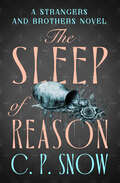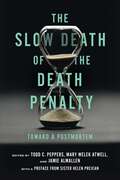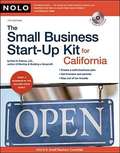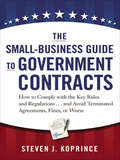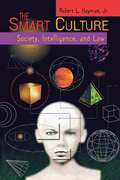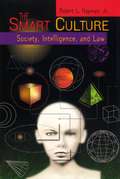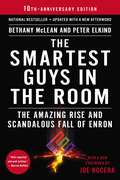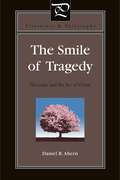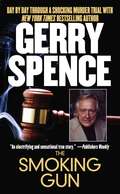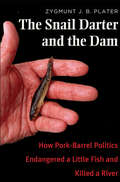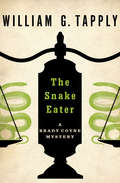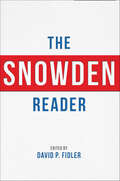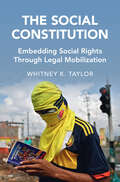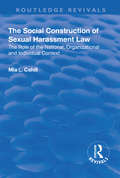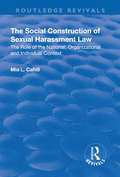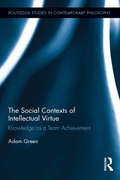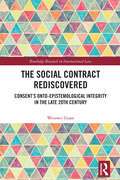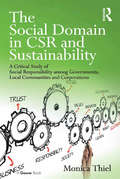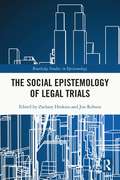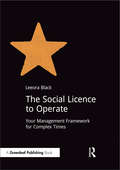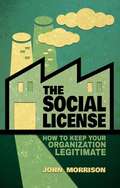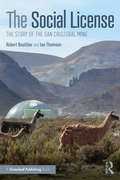- Table View
- List View
The Sleep of Reason (The Strangers and Brothers Novels)
by C.P. SnowWith England on the brink of disruptive social change, a man revisits his past—and confronts a monstrous crime—in this novel of &“clarity and perceptiveness&” (The Atlantic). In his late middle age, semi-retired Lewis Eliot, accompanied by his teenage son, journeys to the provincial town where he spent his poverty-stricken boyhood—and where his father is now dying. The London of the 1960s is changing, and this visit is a reminder of the passage of time and the world left behind. But Eliot&’s reflections are disrupted when he reunites with his now-elderly mentor, George Passant, and becomes involved in a horrifying child-murder case in which Passant&’s niece stands accused. And as Eliot sees his old friend through the trial, troubling questions arise about responsibility, the root causes of evil, and how, as the painter Goya once observed, the sleep of reason produces monsters. &“[The Strangers and Brothers series] invites comparison not only with Proust but with the other notable multi‐volume novel about modern Britain, Anthony Powell&’s The Music of Time.&” —The New York Times &“Lewis Eliot throughout the series has been a most engaging person. . . . Snow is at his best when writing about people under pressure: he makes the struggle for power of engrossing interest.&” —The Atlantic &“[Snow] looks at the social condition so that he can see better the human condition.&” —Queen&’s Quarterly
The Slow Death of the Death Penalty: Toward a Postmortem
by Todd C. Peppers Mary Welek Atwell Jamie AlmallenWhy the death penalty is in decline across the United StatesAcross the country, the death penalty is dying. Twenty-two states have abandoned state-sanctioned executions, including nine in the last fifteen years. Of the twenty-eight states that still have the death penalty, eight have not had an execution in over a decade. And public support for the death penalty has declined from 80% of the surveyed population in the early 1990s to approximately 50% today.As the death penalty slowly withers away, Todd C. Peppers, Jamie Almallen, and Mary Welek Atwell bring together a number of distinguished death-penalty scholars, activists, and attorneys to take an accounting of the damage inflicted by the machinery of death. Contributors to the book point to a range of different pathologies which have caused politicians and voters to turn against capital punishment, from unacceptable rates of false convictions and racially motivated prosecutions, to a clemency process poisoned by political factors.Essay topics include various dimensions of the death penalty, including racial and gender bias; economic costs; the conviction of juveniles, the mentally ill, and the factually innocent; Supreme Court decisions; and the failure of the death penalty to serve as a deterrent against crime. This important volume is an up-to-date accounting of the current state and, as the contributors argue, the future demise of the death penalty.
The Small Business Start-up Kit for California (7th edition)
by Peri Pakroo Catherine CaputoMany people dream of starting a business, but fear that without an MBA they'll get lost in the maze of government red tape. Here's the handbook they need. Step-by-step, The Small Business Start-Up Kit for California outlines how to set up a business in the Golden State quickly and easily, pointing out the hurdles, fees and forms along the way. In language that is clear, readable and straight to the point, the book explains how to: choose the best business structure, write an effective business plan, file the right forms in the right place, be prepared for, and file, the required taxes, acquire good bookkeeping and accounting habits. This completely revamped and updated book provides the latest rules and regulations, all the required forms and an expanded discussion of running a business on the Internet. Includes a sample partnership agreement; county, state and tax forms, and instructions to filling them out.
The Small-Business Guide to Government Contracts: How to Comply with the Key Rules and Regulations . . . and Avoid Terminated Agreements, Fines, or Worse
by Steven J. KoprinceGovernment law attorney Steven J. Koprince teaches you to concentrate on the crucial but complex Federal Acquisition Regulation (FAR) and other rules required for keeping contracts alive and avoiding penalties.Each year, the federal government awards billions of dollars in small-business contracts. The Small-Business Guide to Government Contracts puts a wealth of specialized legal counsel at readers&’ fingertips, answering the most important compliance questions like:Is a small business really small?Who is eligible for HUBZone, 8(a), SDVO, or WOSB programs?What salaries and benefits must be offered?What ethical requirements must be followed?When does affiliation become a liability?Small-business contracts are both the lifeblood of hundreds of thousands of companies and a quagmire of red tape. No one can afford to be lax with the rules or too harried to heed them. The Small-Business Guide to Government Contracts empowers contractors to avoid missteps, meet their compliance obligations--and keep the pipeline flowing.
The Smart Culture: Society, Intelligence, and Law (Critical America #3)
by Robert L Hayman, Jr.What exactly is intelligence? Is it social achievement? Professional success? Is it common sense? Or the number on an IQ test? Interweaving engaging narratives with dramatic case studies, Robert L. Hayman, Jr., has written a history of intelligence that will forever change the way we think about who is smart and who is not. To give weight to his assertion that intelligence is not simply an inherent characteristic but rather one which reflects the interests and predispositions of those doing the measuring, Hayman traces numerous campaigns to classify human intelligence. His tour takes us through the early craniometric movement, eugenics, the development of the IQ, Spearman's "general" intelligence, and more recent works claiming a genetic basis for intelligence differences. What Hayman uncovers is the maddening irony of intelligence: that "scientific" efforts to reduce intelligence to a single, ordinal quantity have persisted--and at times captured our cultural imagination--not because of their scientific legitimacy, but because of their longstanding political appeal. The belief in a natural intellectual order was pervasive in "scientific" and "political" thought both at the founding of the Republic and throughout its nineteenth-century Reconstruction. And while we are today formally committed to the notion of equality under the law, our culture retains its central belief in the natural inequality of its members. Consequently, Hayman argues, the promise of a genuine equality can be realized only when the mythology of "intelligence" is debunked--only, that is, when we recognize the decisive role of culture in defining intelligence and creating intelligence differences. Only culture can give meaning to the statement that one person-- or one group--is smarter than another. And only culture can provide our motivation for saying it. With a keen wit and a sharp eye, Hayman highlights the inescapable contradictions that arise in a society committed both to liberty and to equality and traces how the resulting tensions manifest themselves in the ways we conceive of identity, community, and merit.
The Smart Culture: Society, Intelligence, and Law (Critical America #3)
by Robert L. Jr.What exactly is intelligence? Is it social achievement? Professional success? Is it common sense? Or the number on an IQ test? Interweaving engaging narratives with dramatic case studies, Robert L. Hayman, Jr., has written a history of intelligence that will forever change the way we think about who is smart and who is not. To give weight to his assertion that intelligence is not simply an inherent characteristic but rather one which reflects the interests and predispositions of those doing the measuring, Hayman traces numerous campaigns to classify human intelligence. His tour takes us through the early craniometric movement, eugenics, the development of the IQ, Spearman's "general" intelligence, and more recent works claiming a genetic basis for intelligence differences. What Hayman uncovers is the maddening irony of intelligence: that "scientific" efforts to reduce intelligence to a single, ordinal quantity have persisted--and at times captured our cultural imagination--not because of their scientific legitimacy, but because of their longstanding political appeal. The belief in a natural intellectual order was pervasive in "scientific" and "political" thought both at the founding of the Republic and throughout its nineteenth-century Reconstruction. And while we are today formally committed to the notion of equality under the law, our culture retains its central belief in the natural inequality of its members. Consequently, Hayman argues, the promise of a genuine equality can be realized only when the mythology of "intelligence" is debunked--only, that is, when we recognize the decisive role of culture in defining intelligence and creating intelligence differences. Only culture can give meaning to the statement that one person-- or one group--is smarter than another. And only culture can provide our motivation for saying it. With a keen wit and a sharp eye, Hayman highlights the inescapable contradictions that arise in a society committed both to liberty and to equality and traces how the resulting tensions manifest themselves in the ways we conceive of identity, community, and merit.
The Smartest Guys in the Room: The Amazing Rise and Scandalous Fall of Enron
by Bethany Mclean Peter ElkindThere were dozens of books about Watergate, but only All the President's Men gave readers the full story, with all the drama and nuance and exclusive reporting. And thirty years later, if you're going to read only one book on Watergate, that's still the one. Today, Enron is the biggest business story of our time, and Fortune senior writers Bethany McLean and Peter Elkind are the new Woodward and Bernstein. Remarkably, it was just two years ago that Enron was thought to epitomize a great New Economy company, with its skyrocketing profits and share price. But that was before Fortune published an article by McLean that asked a seemingly innocent question: How exactly does Enron make money? From that point on, Enron's house of cards began to crumble. Now, McLean and Elkind have investigated much deeper, to offer the definitive book about the Enron scandal and the fascinating people behind it. Meticulously researched and character driven, Smartest Guys in the Room takes the reader deep into Enron's past--and behind the closed doors of private meetings. Drawing on a wide range of unique sources, the book follows Enron's rise from obscurity to the top of the business world to its disastrous demise. It reveals as never before major characters such as Ken Lay, Jeff Skilling, and Andy Fastow, as well as lesser known players like Cliff Baxter and Rebecca Mark. Smartest Guys in the Room is a story of greed, arrogance, and deceit--a microcosm of all that is wrong with American business today. Above all, it's a fascinating human drama that will prove to be the authoritative account of the Enron scandal.
The Smile of Tragedy: Nietzsche and the Art of Virtue (Literature and Philosophy #32)
by Daniel R. AhernIn The Smile of Tragedy, Daniel Ahern examines Nietzsche’s attitude toward what he called “the tragic age of the Greeks,” showing it to be the foundation not only for his attack upon the birth of philosophy during the Socratic era but also for his overall critique of Western culture. Through an interpretation of “Dionysian pessimism,” Ahern clarifies the ways in which Nietzsche sees ethics and aesthetics as inseparable and how their theoretical separation is at the root of Western nihilism. Ahern explains why Nietzsche, in creating this precursor to a new aesthetics, rejects Aristotle’s medicinal interpretation of tragic art and concentrates on Apollinian cruelty as a form of intoxication without which there can be no art. Ahern shows that Nietzsche saw the human body as the vessel through which virtue and art are possible, as the path to an interpretation of “selflessness,” as the means to determining an order of rank among human beings, and as the site where ethics and aesthetics coincide.
The Smile of Tragedy: Nietzsche and the Art of Virtue (Literature and Philosophy)
by Daniel R. AhernIn The Smile of Tragedy, Daniel Ahern examines Nietzsche’s attitude toward what he called “the tragic age of the Greeks,” showing it to be the foundation not only for his attack upon the birth of philosophy during the Socratic era but also for his overall critique of Western culture. Through an interpretation of “Dionysian pessimism,” Ahern clarifies the ways in which Nietzsche sees ethics and aesthetics as inseparable and how their theoretical separation is at the root of Western nihilism. Ahern explains why Nietzsche, in creating this precursor to a new aesthetics, rejects Aristotle’s medicinal interpretation of tragic art and concentrates on Apollinian cruelty as a form of intoxication without which there can be no art. Ahern shows that Nietzsche saw the human body as the vessel through which virtue and art are possible, as the path to an interpretation of “selflessness,” as the means to determining an order of rank among human beings, and as the site where ethics and aesthetics coincide.
The Smoking Gun: Day by Day Through a Shocking Murder Trial with Gerry Spence
by Gerry SpenceFrom America's foremost criminal defense lawyer and author of the bestselling How to Argue and Win Every Time comes this riveting, true account of a trial that adeptly exposes the unrelenting power of the state, which so often crushes those -- guilty or innocent -- who come before the bar of justice. It could happen to you. When Sandy Jones and her teenage son were accused of murdering a real estate developer on their hardscrabble Oregon farm, the prosecution had an eyewitness to the shooting and a photograph of Sandy holding a smoking rifle. County officials kept Sandy in jail while they awaited the trial, despite ballistic evidence that strongly suggested she hadn't fired the fatal shot. The case erupted into an epic struggle between Sandy -- who was poor, different, and a woman -- and the "good old boys" of Lincoln County, Oregon, who held all the power. Though the Joneses' guilt seemed eminently clear to the county and the prosecution, Gerry Spence, renowned for his work on the cases of Karen Silkwood and Randy Weaver at Ruby Ridge, took the case pro bono and the courtroom battle exploded into three years of intensely moving jury trials, recounted here from the record of the case. The Smoking Gun follows Gerry Spence through his passionate arguments with two different judges and two different prosecutorial teams, his exacting jury selection, his expert questioning of the witnesses, and his incredible rapport with the jury as he fights for the rights of Sandy and her son. With a superb sense of drama and an intimate knowledge of the court system, Spence highlights the pitfalls that every defendant faces, making The Smoking Gun extremely relevant today, when our rights are being eroded and when the average American, even if innocent, is hard-pressed to obtain a fair trial.
The Snail Darter and the Dam
by Zygmunt Jan PlaterEven today, thirty years after the legal battles to save the endangered snail darter, the little fish that blocked completion of a TVA dam is still invoked as an icon of leftist extremism and governmental foolishness. In this eye-opening book, the lawyer who with his students fought and won the Supreme Court case--known officially as Tennessee Valley Authority v. Hill--tells the hidden story behind one of the nation's most significant environmental law battles.The realities of the darter's case, Plater asserts, have been consistently mischaracterized in politics and the media. This book offers a detailed account of the six-year crusade against a pork-barrel project that made no economic sense and was flawed from the start. In reality TVA's project was designed for recreation and real estate development. And at the heart of the little group fighting the project in the courts and Congress were family farmers trying to save their homes and farms, most of which were to be resold in a corporate land development scheme. Plater's gripping tale of citizens navigating the tangled corridors of national power stimulates important questions about our nation's governance, and at last sets the snail darter's record straight.
The Snake Eater (The Brady Coyne Mysteries #12)
by William G. TapplyInvestigating the murder of a Vietnam veteran, Boston lawyer Brady Coyne uncovers a military conspiracy in this &“good, fast read&” (Publishers Weekly). Daniel McCloud may grow marijuana, but as far as he&’s concerned, that does not make him a criminal. A Vietnam veteran still suffering from exposure to Agent Orange, he&’s found no help from the government and no relief outside of homegrown grass. When the local police in his small New England town bust him for possession, a friend reaches out to Brady Coyne, a Boston lawyer who usually works with New England&’s upper class. Brady is readying Daniel&’s defense when the case is inexplicably dropped. He&’s just beginning to wonder why when the veteran is found murdered. McCloud had written a memoir, but the manuscript is nowhere to be found. Someone killed the author to keep it from ever seeing the light of day. As Brady digs into McCloud&’s time in the army, he finds that this troubled vet made some enemies in the jungle.
The Snowden Reader
by David P. FidlerWhen Edward Snowden began leaking NSA documents in June 2013, his actions sparked impassioned debates about electronic surveillance, national security, and privacy in the digital age. The Snowden Reader looks at Snowden's disclosures and their aftermath. Critical analyses by experts discuss the historical, political, legal, and ethical issues raised by the disclosures. Over forty key documents related to the case are included, with introductory notes explaining their significance: documents leaked by Snowden; responses from the NSA, the Obama administration, and Congress; statements by foreign leaders, their governments, and international organizations; judicial rulings; findings of review committees; and Snowden's own statements. This book provides a valuable introduction and overview for anyone who wants to go beyond the headlines to understand this historic episode.
The Social Constitution: Embedding Social Rights Through Legal Mobilization (Cambridge Studies in Law and Society)
by Whitney K. TaylorIn The Social Constitution, Whitney Taylor examines the conditions under which new constitutional rights become meaningful and institutionalized. Taylor introduces the concept of 'embedding' constitutional law to clarify how particular visions of law come to take root both socially and legally. Constitutional embedding can occur through legal mobilization, as citizens understand the law in their own way and make legal claims - or choose not to - on the basis of that understanding, and as judges decide whether and how to respond to legal claims. These interactions ultimately construct the content and strength of the constitutional order. Taylor draws on more than a year of fieldwork across Colombia and multiple sources of data, including semi-structured interviews, original surveys, legal documents, and participation observation. This title is part of the Flip it Open Programme and may also be available Open Access. Check our website Cambridge Core for details.
The Social Construction of Sexual Harassment Law: The Role of the National, Organizational and Individual Context (Routledge Revivals Ser.)
by Mia CahillThis title was first published in 2001. The global legal landscape is littered with attempts to provide context and meaning for sexual harassment law. Most have failed because they have limited themselves to the mere words of law. This cross-national study is the first to expand our notion of sexual harassment law and implementation by exposing the relationship between law and its social context, demonstrating how this fundamentally influences legal understandings and outcomes. Taking a unique theoretical approach, this book explores perceptions of law within national, corporate and the individual contexts, analyzing the potentials of each level to influence the social understanding of law and the wider role of law in society itself. The result is a pioneering work of fresh insight which will appeal to a broad range of academic disciplines.
The Social Construction of Sexual Harassment Law: The Role of the National, Organizational and Individual Context (Routledge Revivals)
by Mia L. CahillThis title was first published in 2001. The global legal landscape is littered with attempts to provide context and meaning for sexual harassment law. Most have failed because they have limited themselves to the mere words of law. This cross-national study is the first to expand our notion of sexual harassment law and implementation by exposing the relationship between law and its social context, demonstrating how this fundamentally influences legal understandings and outcomes. Taking a unique theoretical approach, this book explores perceptions of law within national, corporate and the individual contexts, analyzing the potentials of each level to influence the social understanding of law and the wider role of law in society itself. The result is a pioneering work of fresh insight which will appeal to a broad range of academic disciplines.
The Social Contexts of Intellectual Virtue: Knowledge as a Team Achievement (Routledge Studies in Contemporary Philosophy)
by Adam GreenThis book reconceives virtue epistemology in light of the conviction that we are essentially social creatures. Virtue is normally thought of as something that allows individuals to accomplish things on their own. Although contemporary ethics is increasingly making room for an inherently social dimension in moral agency, intellectual virtues continue to be seen in terms of the computing potential of a brain taken by itself. Thinking in these terms, however, seriously misconstrues the way in which our individual flourishing hinges on our collective flourishing. Green’s account of virtue epistemology is based on the extended credit view, which conceives of knowledge as an achievement and broadens that focus to include team achievements in addition to individual ones. He argues that this view does a better job than alternatives of answering the many conceptual and empirical challenges for virtue epistemology that have been based on cases of testimony. The view also allows for a nuanced interaction with situationist psychology, dual processing models in cognitive science, and the extended mind literature in philosophy of mind. This framework provides a useful conceptual bridge between individual and group epistemology, and it has novel applications to the epistemology of disagreement, prejudice, and authority.
The Social Contract Rediscovered: Consent’s Onto-Epistemological Integrity in the Late 20th Century (Routledge Research in International Law)
by Wenwei GuanThe Social Contract Rediscovered conducts a critical analysis of the historical evolution of legitimacy, tracing its development from natural law to positive law and finally to post-modern critiques. It fills a scholarly gap by addressing the overlooked aspect of the consent process.The book begins with a recap of the historical development of social contract theory. It draws from a broad base of jurisprudential and social theories to think through how social contract’s rise and fall forms an integral part of legitimacy’s modernization process from the Enlightenment-driven Industrial Revolution’s global proliferation to the end of the 20th century. It then integrates discussion of consensus construction at three levels: private contract legitimacy, national development consensus, and global modern exchange mechanism in the late 20th century. Rather than ask how state legitimacy is constructed in social contract theory, the book asks what role an individual plays in the process of consensual legitimacy construction. This individual-oriented perspective calls for a jurisprudential construction of “process legitimacy” and consensual legitimacy’s onto-epistemological integrity.Providing a new perspective on the social contract, this book will interest scholars of private law, international trade, and development law.
The Social Contract, Discourse On The Virtue Most Necessary For A Hero, Political Fragments And Geneva Manuscript
by Jean-Jacques Rousseau Christopher Kelly Judith R. Bush Roger D. MastersContains the Social Contract, as well as the first English translation of Rousseau's early Discourse on the Virtue Most Necessary for a Hero, numerous previously untranslated political fragments, and the first draft of the Social Contract (the so-called Geneva Manuscript). By placing Rousseau's famous exposition of "political right" and the "general will" in the context of his preparatory drafts, the editors provide significant insight into the formation of one of the most important and influential works in Western political thought.
The Social Domain in CSR and Sustainability: A Critical Study of Social Responsibility among Governments, Local Communities and Corporations
by Monica ThielHow can greater understanding of social responsibility within a local context empower companies, local communities and governments? What is the relationship among business, local communities and governments with regard to social responsibility in developing, emerging and advanced economies? What is the nature of the relationship between individual responsibility, social responsibility and profit? These are some of the most meaningful questions in the CSR and sustainability sphere today - and yet hitherto the ’social domain’ has received remarkably little detailed coverage. In this fascinating book Monica Thiel tackles these questions head-on; discussing the lack of social responsibility engagement with local communities by corporations and governments, and the lack of reciprocal social responsibility and sporadic participation from individuals and local communities themselves. The Social Domain in CSR and Sustainability provides a new and unique contribution to the body of knowledge in CSR and sustainability. With practical tools for business, government and local community leaders faced with challenging societal constraints and consumer and public demands on a daily basis - readers will be in a better position to manage and develop CSR and sustainability strategies, a task increasingly crucial for successful managers and leaders in companies, local communities and governments.
The Social Epistemology of Legal Trials (Routledge Studies in Epistemology)
by Zachary Hoskins Jon RobsonThis collection is the first book-length examination of the various epistemological issues underlying legal trials. Trials are centrally concerned with determining truth: whether a criminal defendant has in fact culpably committed the act of which they are accused, or whether a civil defendant is in fact responsible for the damages alleged by the plaintiff. Truth is not, however, the only epistemic value which seems relevant to how trials proceed. We may think that a jury shouldn’t convict a defendant, even one who is as a matter of fact guilty, unless its members know or at least are justified in believing that the defendant committed the crime in question. Similarly, we might reasonably assume that the trier of fact must have some level of understanding to reach an adequate verdict in any case, but legitimate questions arise as to what level of understanding should be required. The essays collected in this volume consider a range of epistemological issues raised by trials, such as how much credence jurors should give to eyewitness testimony, the admissibility and role of statistical evidence, and the appropriate standards of proof in different contexts. The Social Epistemology of Legal Trials will be of interest to scholars and upper-level students working on issues at the intersection of epistemology and philosophy of law.
The Social Foundations of World Trade
by Sungjoon ChoAs highlighted by Pascal Lamy, the former head of the WTO, world trade traditionally involves state-to-state contracts and is based on an anachronistic 'monolocation' production/trade model. It therefore struggles to handle new patterns of trade such as global value chains, which are based on a 'multilocation' model. Although it continues to provide world trade on a general level with a powerful heuristic, the traditional 'rationalist' approach inevitably leaves certain descriptive and normative blind spots. Descriptively, it fails to explain important ideational factors, such as culture and norms, which can effectively guide the behaviour of trading nations with or without material factors such as interests and utilities. Normatively, the innate positivism of the traditional model makes it oblivious to the moral imperatives of the current world trading system, such as development. This book emphatically redresses these blind spots by reconstructing the WTO as a world trade community from a social perspective.
The Social Licence to Operate: Your Management Framework for Complex Times (DoShorts)
by Leeora BlackThe "social licence to operate" began as a metaphor to bring attention to the need for companies to earn acceptance from their host communities. Today, it is a necessary management framework for complex times.A social licence strategy is essentially a stakeholder engagement strategy for navigating complex socio-political environments. This book provides the framework, tools and case studies a company needs to create a foundation for truly sustainable community development.This 90-minute guide will enable you to: define the social licence to operate; make the business case for actively managing your social licence to operate; measure the social licence to operate; develop a step-by-step plan to restore, build, maintain and enhance your company’s social licence; and report on your social licence.This book is for managers in any company facing rising social scrutiny due to unwanted social or environmental impacts. You may be working in natural resources, renewable energy, oil and gas, forestry, construction, manufacturing, retail, food processing, pharmaceuticals or any industry that is facing rising stakeholder expectations and increasing criticism.
The Social License
by John MorrisonA distinctive and direct guide to legitimacy in business, focusing on the new benchmark of a 'Social License to Operate'. Featuring case studies of what is and isn't working, this book explains how business owners and CSR professionals can integrate legitimacy into the heart of their company strategy, beyond CSR and good PR.
The Social License: The Story of the San Cristobal Mine
by Ian Thomson Robert BoutilierThis unique book combines a colourful history of Bolivian politics with some of the most advanced quantitative techniques yet developed for socio-political risk analysis. This is the story of how a foreign-owned private sector mining company (Minera San Cristobal - MSC) earned, lost, and regained its social licence to operate. Robert G. Boutilier and Ian Thomson, leading experts in stakeholder management theory and practice, transform the concept of the SLO from a metaphor to a management tool. The book traces the development of new concepts and measures in the field of stakeholder engagement while following the narrative of a community struggling with a fundamental change in its identity from a declining, malnourished llama-herding village to one of the richest towns in Bolivia. This remarkable story will inspire practitioners in the field of stakeholder management; it will provide an invaluable roadmap for professionals working on land re-use projects in the energy, mining, and conservation sectors; it will make stakeholder relations concepts and techniques accessible to students through an engaging and in-depth case study; and it will open your eyes to one of the most fascinating accounts of how two different cultures collided and then came together to address different but aligned goals.
